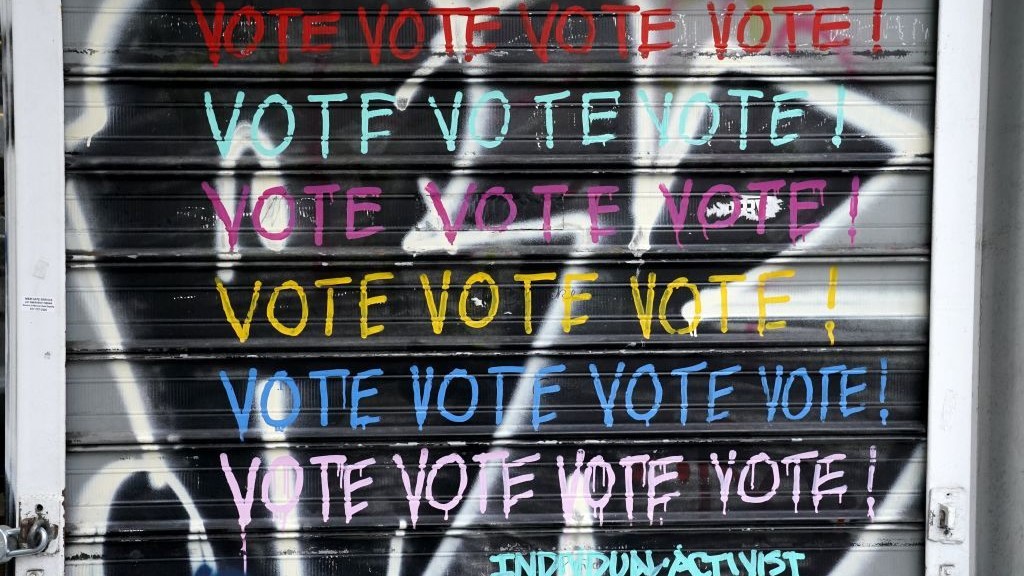Why Can't We Vote Online in the 2020 Presidential Election?
There are pros and cons to online voting, but for now, it's (mostly) prohibited.


In 2020, we can connect with friends and family online, run a business online, put on concerts and award shows online, and even conduct official government business like filing taxes and renewing driver's licenses online. It makes sense, then, that many Americans would prefer to vote in national elections through an app on their phones—I mean, if it's good enough for The Masked Singer, it should be good enough for the federal government, right?
Unfortunately, online voting is still not an option for the vast majority of U.S. voters. At this point, the convenience factor is still far outweighed by security risks, especially as it becomes increasingly clear how readily nations like Russia and Iran will jump at the chance to interfere in American elections. So, for the 2020 presidential election, at least, you'll need to follow traditional protocols of voting either in-person or by mail (and sooner rather than later, with Election Day less than two weeks away).
In the meantime, here's everything you need to know about online voting, from who currently gets to do it to the risks involved.
Who can vote online?
For the most part, only those Americans covered by the Uniformed and Overseas Citizens Absentee Voting Act are allowed to vote online. UOCAVA ensures that all active members of the military, Merchant Marine, U.S. Public Health Service, and National Oceanic and Atmospheric Administration and their families, as well as U.S. citizens living abroad, are given the opportunity to participate in elections easily and in a timely manner.
In many cases, this means they get to do so through an online portal or app, or via email or fax, since many of those covered by the law don't have access to reliable postal services. So far, four states have implemented an online portal for returning ballots, and only one, West Virginia, has a voting app. Additionally, Utah County, Utah, is allowing for the use of a similar voting app in the 2020 election.
Just a handful of states also allow voters not covered by UOCAVA to vote online in some capacity, according to the National Conference of State Legislatures. In Hawaii, absentee voters who have not received their ballots by mail within five days of the election can email their ballots; in Idaho, residents directly affected by an officially declared national or local emergency can vote via email or fax; in Louisiana, disabled voters can vote by fax, and in Utah, they can do so by email or fax.
Have any states tried to make online voting more widespread?
The closest we've gotten to allowing anyone regardless of disability status or UOCAVA eligibility to vote online was a plan proposed in 2019 to allow caucuses in Iowa and Nevada to occur remotely the following year. The virtual caucuses hoped to improve voter turnout and make the election process more accessible to many voters.
Get exclusive access to fashion and beauty trends, hot-off-the-press celebrity news, and more.
Before the new technology could be implemented, however, the Democratic National Committee recommended that the plan be scrapped. In an Aug. 2019 statement, per NPR, DNC leadership said, "There is no tele-caucus system available that meets our standard of security and reliability given the scale needed for the Iowa and Nevada caucuses and the current cybersecurity climate."
Have any of those online voting systems been hacked?
Not exactly, but studies have shown that they are certainly vulnerable. Cybersecurity experts and computer scientists have identified many serious flaws in Voatz, the voting app technology being used by West Virginia and Utah County in the 2020 election, and which has also been used on a smaller scale in regions of Colorado, Oregon, and Massachusetts.
In 2019, a group of cybersecurity experts penned an open letter to the app's developers expressing their many concerns with the technology and a lack of transparency surrounding its development and use; their questions about Voatz's security infrastructure span 10 pages. "While much of this secrecy might be understandable for an ordinary business product and service, it should not be acceptable in a public voting system whose details should be transparent to voters, candidates, and the public at large," they wrote.
And in a report released in February of this year, MIT researchers found that hackers could potentially change an individual's vote in the Voatz system and expose voter information with relative ease. Even more worryingly, the researchers identified a way that hackers with a specific agenda could then use that voter information to prevent people they expect to vote a certain way from connecting to the Voatz servers at all.
On a similar note, Alaska, which previously allowed all UOCAVA voters to return their ballots through an online portal, shut down the portal in 2018, citing cybersecurity concerns, even without any evidence that the system had ever been compromised.
Will we ever be able to vote for president online?
Probably not. Though people in favor of implementing online voting systems say they'll help increase the U.S.'s abysmal turnout numbers, cybersecurity experts are adamant that mixing elections and the internet is always going to be a bad idea, since there is no such thing as a 100 percent secure online system. "I come down with getting as many computers out of the process as you can. ... Every time you introduce a technology layer, you have these cascades of unintended consequences," cybersecurity expert Rich DeMillo, former chief technology officer of Hewlett-Packard, told NPR in 2019.
As Ron Wyden, D-Ore., put it so succinctly during a 2019 Senate session on election security, online voting is "about the worst thing you can do in terms of election security in America, short of putting American ballot boxes on a Moscow street."
So, for this and every election in the foreseeable future, make sure to double-check your registration and either send your mail-in ballot as early as possible or get familiar with your nearest in-person voting location.
Andrea Park is a freelance writer for Marie Claire, where she writes mainly about pop culture, drawing on her lifelong obsessions with consuming every book, movie, and TV show she can get her hands on. Andrea is based in Chicago and graduated from Northwestern University's Medill School of Journalism and Columbia University's Graduate School of Journalism. Her byline has also appeared in W, Glamour, Teen Vogue, PEOPLE, and more.
